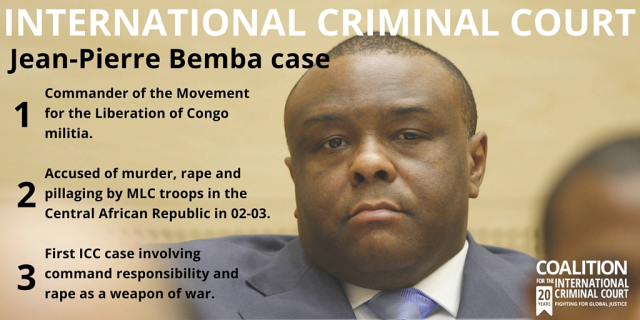The Jean-Pierre Bemba Case

Jean Pierre Bemba , a prominent Congolese politician and former Vice president of the Democratic Republic of Congo(DRC) is a pivotal player in the field of International Justice through his prosecution by the International Criminal Court(ICC). The case against Bemba remains a hallmark for the ICC , marking the first time a high ranking military commander was tried and convicted for crimes committed by forces under their command.
Background
Jean Pierre Bemba was a leader of the Movement for the Liberation of Congo or the MLC , it was a rebel group that operated in the DRC during the second Congo war(1998-2003), his involvement extended beyond the DRC, specifically into the neighboring nation of the Central African Republic (CAR), where troops have been accused of committing several atrocities and war crimes. Charges and Legal Framework In 2008 , Bemba was arrested in Belgium , and transferred to the ICC to face charges of war crimes and crimes against humanity allegedly committed by MLC troops in the CAR. To specify , these charges include murder , rape and pillaging. The legal basis for these charges is centered on some key principles of international criminal law.
Command Responsibility: This principle holds leaders accountable for crimes committed by their subordinates if they knew or should have known about the crimes and failed to prevent or punish them.
Crimes against Humanity: These are serious crimes that are widespread or systematic attacks against the civil population, these may include murder, rape and other forms of sexual violence.
War crimes: The violations of laws and customs of war, such as murder, torture or intentional attacks of civilians may defined as war crimes.
Under these above principles , Jean Pierre Bemba was tried under the International Criminal Court
Trial proceedings
The trial of Jean Pierre Bemba began in November 2010 and lasted several years. This highlights the key criticism presented against the International Criminal Court and the International Court of Justice; the Beaurocratic, time consuming due process. Critics argue that in the time these War criminals are being tried in court, people in their countries may continue to be subjected to violations of human rights and war crimes. Regardless, the trail proceeded.
Prosecutors presented evidence that MLC troops , under Bemba’s command , had committed several crimes against civilians in the Central African Republic between 2002 and 2003. This evidence included witness testimonies , documents and forensic evidence linking Bemba to the crimes.
During the trial, the defense however argued that Bemba did not have effective control over his troops in the CAR and therefore could not be held responsible for their actions, furthermore they challenged the legitimacy of some witnesses and the authenticity of certain pieces of evidence presented by the prosecution.
Verdict and Sentencing
After much due deliberation , In March 2016, the ICC Trial Chamber found Jean-Pierre Bemba guilty of two counts of crimes against humanity (murder and rape) and three counts of war crimes (murder, rape, and pillaging). He was sentenced to 18 years in prison, marking a highly significant milestone for the ICC in holding a high-ranking military leader accountable for crimes committed by his forces.
Appeals and Acquittal
The celebration of this milestone however could only last so long. In June 2018, the ICC Appeals Chamber overturned Bemba's conviction. The Appeals Chamber found that the Trial Chamber had made errors in its assessment of whether Bemba had effective control over the MLC troops in the CAR. Specifically, the Appeals Chamber ruled that the Trial Chamber had not properly considered evidence that Bemba took reasonable measures to prevent or punish the crimes committed by his troops. This decision to overturn Bemba's conviction was controversial and raised questions about the interpretation and application of command responsibility in international criminal law. It also underscored the challenges faced by international courts in conducting fair and thorough trials, especially in cases involving complex legal and factual issues.
Impact and Legacy
The Jean-Pierre Bemba case has undoubtedly had a lasting impact on international justice, and served as a poignant reminder of the need for accountability in military commanders for crimes committed under their leadership. Furthermore, this case set a precedent for holding military commanders responsible for crimes committed by their forces even when they’re not physically present and the scene of the crimes. It sparked potent debates and discussions among legal experts on the scope and applications of command responsibility and the ICC’s role in providing justice and reparations to victims of serious crimes, including survivors of sexual violence and other atrocities. Furthermore, it underscores the importance of raising awareness on war crimes committed by military personal and the need for substantive action towards the protection of civilian rights in conflict zones. As the global community comities to grapple with issues of accountability and impunity in conflict zones, the Bemba case serves as a reminder of the ongoing pursuit of justice and the complexities of achieving it on the international Stage.
